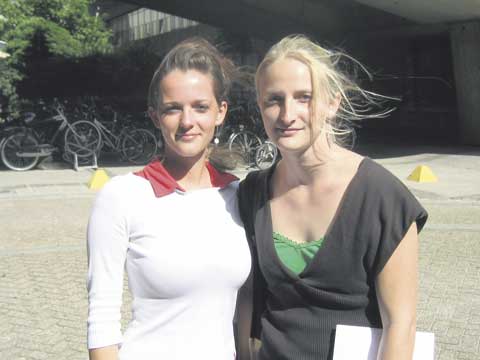Once upon a time the TU Delft`s geophysics section was facing an uncertain future. But thanks to a new Idea league joint MSc program, the section is now flourishing.
On September 1, the first six students received their Idea League Joint Master’s degrees in Applied Geophysics. Meanwhile 14 new arrivals to this program were welcomed in Delft to start the first part of the program, before moving on to study at ETH Zurich and then RWTH Aachen.
Several years ago the geophysics section of TU Delft was confronted with an ever-decreasing number of students enrolling in the program. At least 20 new students are needed each year for a program to be considered healthy, yet the geophysics section was welcoming just three or four new students annually.
The alarm bells were ringing for this proud program. To resurrect it, unorthodox measures were necessary to drive up the student enrolment numbers. Encouraged by the positive experiences stemming from the section’s existing international program, and motivated by the university administration to engage in projects within the Idea League, the TU’s geophysics section contacted ETH Zurich and RWTH Aachen: the result was the creation of a joint MSc program.
Under the guidelines of this joint MSc program, the students spend a semester at each of the three partner universities and then work on their Master’s thesis at one of the partner universities or with a company from the relevant industry. The result is a strong technological program that provides the students with skills they can apply once they are out in the workforce, allowing them to ultimately choose between a career in industry or academia.
Three of the program’s first six graduates have indeed chosen to pursue PhD degrees, while the other three graduates are now starting new jobs with various companies. The joint geophysics MSc class of 2006 started with just six students enrolled in the program; however, in 2007, 16 students from nine countries joined the program, and in 2008 14 students from ten countries are now following the program.
Dr. Evert Slob, the academic coordinator of the joint MSc program at TU Delft, is satisfied with these numbers, but he would like to welcome even more students into the program in future. “We would be happy to see the numbers rising quickly and sustainably to at least 20 students per year,” he confirms.
Hands dirty
Some of the students entering this joint MSc program have already completed another MSc degree before joining this program, but they are nevertheless enthusiastic about the practical, ‘hands-on’ approach the program offers.
Abbi Saurabh and Roy Srikumar, who come from India, learned about the program through the geophysics department or university in India. The two Indians are hoping to acquire the applied skills that come with the industry-oriented education offered by the Idea League. Hanna Dura and Anne Obermann, from Germany, completed their MSc degrees at the universities of Aachen and Hamburg respectively. “The university education we receive in Germany is rather theoretical at times,” Obermann says, “so we are hoping to get our hands dirty’, to gain crucial practical experience, during this joint Master’s program.” Judging from the stories told by the program’s graduates and second-year students, gaining such valuable practical experience that benefits a subsequent career in industry is virtually a sure thing in this program. For example, the program’s field
work last year consisted of gathering, processing and interpreting data at two archaeological sites in the vicinity of Zurich, and according to the students there was literally a huge amount of dirt involved for getting one’s hands dirty.
The joint Master’s program students also get plenty of opportunities to gather international experience. Fabian Hurter, from Switzerland, one of the recent graduates, spent an “amazing” two months in New Zealand, where he gathered seismic data for his thesis work.
The only Dutch student in the program so far, Petra Donkers, says she has enjoyed working in multicultural groups; however, she did find herself forced to defend the freedom of speech in the Netherlands while sharing an apartment in Zurich with two Islamic students who did not appreciate the notorious anti-Islam film, Fitna, made by Dutch right-wing politician Geert Wilders.
Next generation
While the program is successful on multiple fronts, one of the major drawbacks mentioned by the students is the cost of living in Delft. The housing prices in Delft of around 390 euro per month are generally regarded as “totally unreasonable”. Even in Zurich, the most expensive city in Europe, the available housing is approximately two-thirds the price of comparable housing in Delft.
The students also say that having to move twice a year from one European city to another is quite demanding in logistical terms. At 11,000 euro per year for non-European students, the tuition fees are also significant to be reckoned with.
Several companies have however responded to requests for external funding and have provided funds for scholarships. The money is being provided without conditions, as these companies feel the need to invest in cultivating the ‘next generation’ of geoscientists in times of labour force shortages in the sector. With most of the sector’s current labour force being over 50 years of age, these young geophysics students have no concerns about finding employment after graduation.
When asked about the special qualities of the program, Slob says it will take several years before companies are willing to give money for such a new track. “Once one company supports students to follow this program, others will more easily become interested in doing the same,” Slob says. “One must promote oneself though and invest in one’s contacts.” Having studied at three different universities across Europe during past two years, the new graduates of the geophysics joint program have definitely invested in their futures.



Comments are closed.